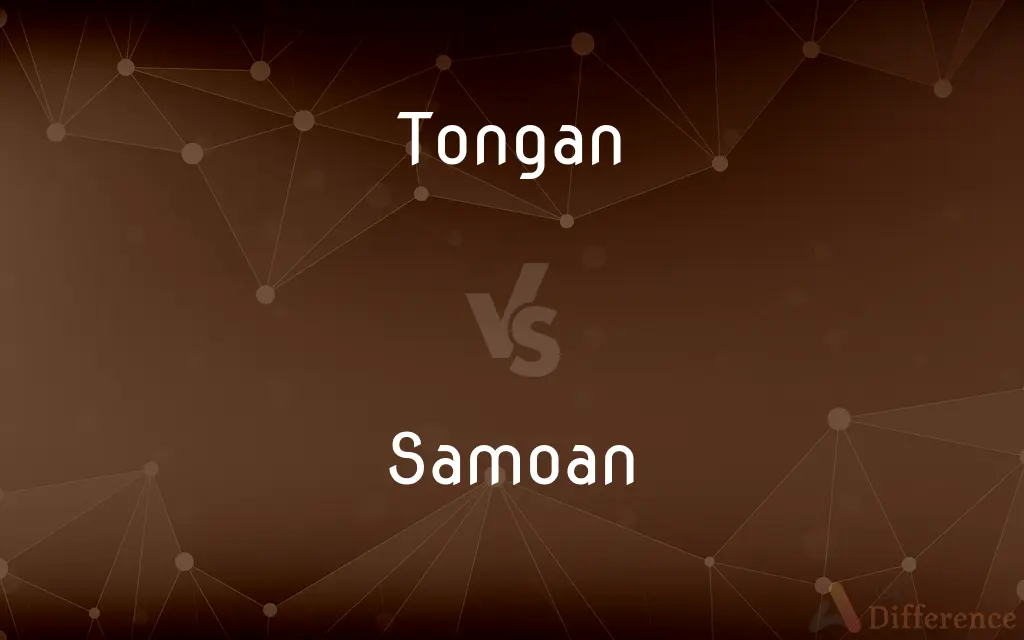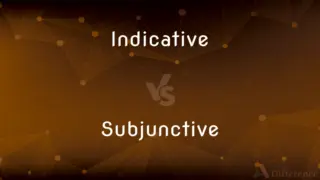Tongan vs. Samoan — What's the Difference?
By Urooj Arif & Maham Liaqat — Updated on March 25, 2024
Tongan relates to Tonga and its culture; Samoan pertains to Samoa and its traditions.

Difference Between Tongan and Samoan
Table of Contents
ADVERTISEMENT
Key Differences
Tongan and Samoan refer to the peoples, cultures, languages, and traditions of Tonga and Samoa, respectively. While both are part of the wider Polynesian cultural and linguistic family, they have distinct identities, histories, and practices.
Tonga, known for its monarchy and seafaring heritage, has a unique social structure and hierarchy. The Tongan culture emphasizes respect for authority, kinship bonds, and community responsibilities. Samoan culture, similarly centered on community and family, is renowned for its 'fa'a Samoa' way of life, which stresses the importance of respect, social relationships, and communal living.
The Tongan language, or lea faka-Tonga, is the native tongue of Tonga and is part of the Polynesian branch of the Austronesian languages. Samoan, or Gagana Samoa, serves the same role in Samoa. Both languages are central to their respective cultural identities, though they have distinct grammatical structures, vocabularies, and pronunciations.
Tongan society is characterized by a hierarchical structure, with the monarchy at its apex, followed by nobles, and commoners. This contrasts with Samoan society, where chiefly titles and the matai system play a significant role in governance and social organization, emphasizing communal decision-making and leadership.
Cultural expressions such as dance, music, and tattooing are significant in both Tongan and Samoan cultures but manifest differently. For instance, the Tongan 'lakalaka' dance and the Samoan 'siva' and 'fa'ataupati' (slap dance) highlight distinct cultural narratives, attire, and performance styles.
ADVERTISEMENT
Comparison Chart
Geographic Origin
Tonga
Samoa
Language
Tongan (lea faka-Tonga)
Samoan (Gagana Samoa)
Social Structure
Monarchical, with a clear hierarchy
Centered on the matai system, with communal leadership
Cultural Identity
Strongly tied to monarchy and seafaring heritage
Emphasizes communal living and 'fa'a Samoa'
Dance and Music
Lakalaka, emphasizing royal and historical narratives
Siva, fa'ataupati, focusing on storytelling and communal joy
Compare with Definitions
Tongan
People.
The Tongan people have a rich seafaring tradition, navigating the Pacific long before European contact.
Samoan
Society.
The matai system in Samoan society governs social organization, land distribution, and community leadership.
Tongan
Language.
The Tongan language is known for its distinctive Polynesian linguistic characteristics.
Samoan
Arts.
Samoan tattooing, or 'tatau', is a revered cultural practice with deep historical and spiritual significance.
Tongan
Society.
Tongan society is organized around a hierarchical structure that includes the king, nobles, and commoners.
Samoan
People.
Samoans maintain a strong communal bond, reflected in their living arrangements and social practices.
Tongan
Culture.
In Tongan culture, the kava ceremony is an important social and ritual activity.
Samoan
Language.
Samoan language serves as a crucial vehicle for passing down oral traditions and cultural heritage.
Tongan
Arts.
Traditional Tongan art includes intricate tapa cloth and finely crafted wood carvings
Samoan
Culture.
The 'fa'a Samoa' way of life underpins Samoan culture, emphasizing respect, family, and community.
Tongan
Relating to Tonga or its people or language.
Samoan
Of or relating to the islands of Samoa.
Tongan
A native or inhabitant of Tonga.
Samoan
Of or relating to the country of Samoa or the territory of American Samoa.
Tongan
The Polynesian language spoken in Tonga.
Samoan
A native or inhabitant of the islands or country of Samoa.
Tongan
Of or relating to Tonga or its people, language, or culture.
Samoan
The Polynesian language of the Samoans.
Tongan
A native or inhabitant of Tonga.
Samoan
Of or pertaining to the Samoan Islands (formerly called Navigators' Islands) in the South Pacific Ocean, or their inhabitants.
Tongan
A person of Tongan ancestry.
Samoan
A native or inhabitant of the Samoan Islands
Tongan
The Polynesian language of Tonga.
Samoan
Of or relating to Samoa or its people or language or culture;
Samoan fishing industry
Tongan
A native or inhabitant of Tonga
Tongan
Of or relating to the island monarchy of Tonga or its people;
Tongan beaches
Common Curiosities
Are there similarities between Tongan and Samoan cultures?
Yes, both cultures share Polynesian roots, emphasizing strong community bonds, respect for tradition, and the importance of family and social hierarchy.
What distinguishes Tongan and Samoan languages?
Tongan and Samoan languages, while both Polynesian, have distinct vocabularies, pronunciations, and grammatical structures.
How do Tonga and Samoa's political systems differ?
Tonga has a constitutional monarchy with a historical royal lineage, whereas Samoa operates under a parliamentary democracy with a focus on the matai system.
What role does dance play in Tongan and Samoan societies?
Dance is a crucial cultural expression in both societies, used to tell stories, celebrate, and maintain historical and communal ties.
What are the key differences in family structures between Tongans and Samoans?
Both cultures value extended family networks, though the specific roles and expectations can vary, influenced by social systems like the matai system in Samoa.
What is the significance of land in Tongan and Samoan cultures?
Land is of paramount importance, tied to family, social status, and economic livelihood, with distinct traditions governing land ownership and use.
How is social hierarchy established in Tongan and Samoan cultures?
Tongan society is structured around a monarchy and nobility, whereas Samoan society revolves around the matai system and communal leadership.
Can Tongans and Samoans understand each other's languages?
While there may be some mutual intelligibility due to their shared Polynesian roots, the languages have significant differences.
How do Tongan and Samoan communities view tattoos?
Tattoos are highly significant in both cultures, serving as symbols of identity, status, and cultural heritage.
What are the main religious practices in Tonga and Samoa?
Christianity plays a central role in both cultures, integrated into many aspects of social and cultural life.
How do traditional and modern influences coexist in Tongan and Samoan societies?
Traditional values and modern influences coexist through cultural practices, language preservation, and adaptation to contemporary societal changes.
What are the educational systems like in Tonga and Samoa?
Both countries have education systems that blend traditional knowledge with modern curricula, emphasizing cultural heritage and academic achievement.
How do Tongan and Samoan cultures celebrate important life events?
Important life events are celebrated with extensive community involvement, traditional ceremonies, and rituals that reflect each culture's values.
What challenges do Tonga and Samoa face today?
Challenges include environmental sustainability, economic development, and preserving cultural identity amidst globalization.
How have Tongan and Samoan societies adapted to globalization?
They have adapted through diaspora communities, technological advancements, and economic development, while striving to maintain cultural integrity.
Share Your Discovery

Previous Comparison
Poise vs. Grace
Next Comparison
Indicative vs. SubjunctiveAuthor Spotlight
Written by
Urooj ArifUrooj is a skilled content writer at Ask Difference, known for her exceptional ability to simplify complex topics into engaging and informative content. With a passion for research and a flair for clear, concise writing, she consistently delivers articles that resonate with our diverse audience.
Co-written by
Maham Liaqat















































